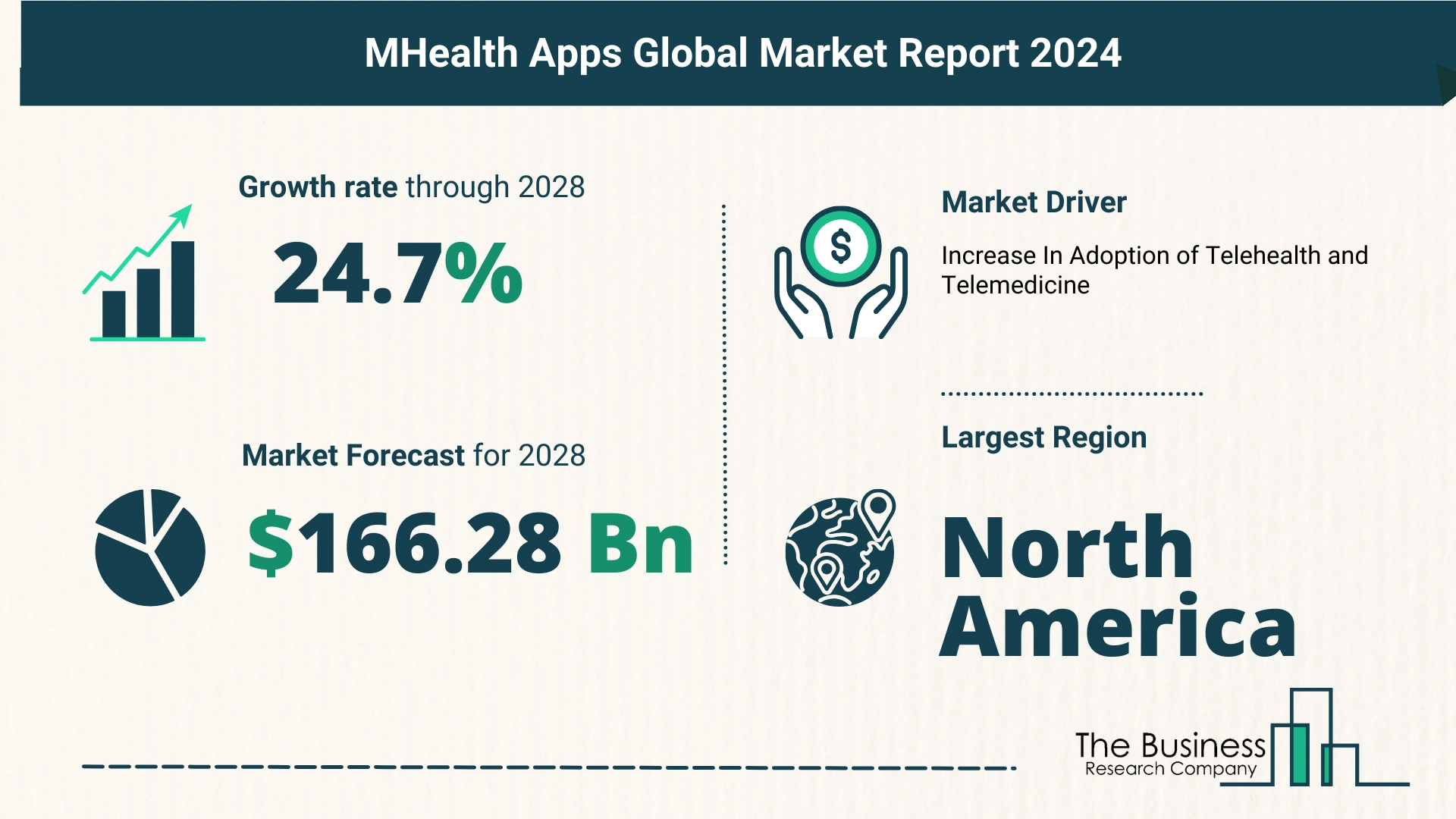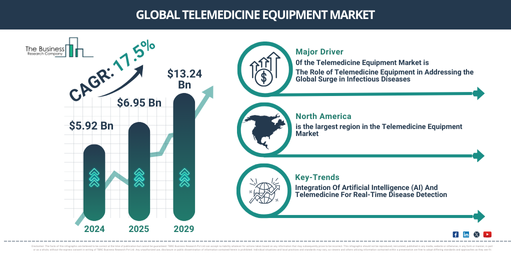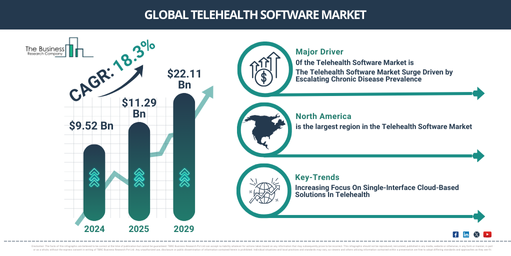Comprehensive Analysis On Size, Share, And Drivers Of The mHealth Apps Market
The Business Research Company’s global market reports provide comprehensive analysis on the various markets in 27 industries across 60 geographies.
Rapid Growth and Market Expansion
The mHealth apps market has witnessed exponential growth in recent years, ballooning from $55.32 billion in 2023 to an anticipated $68.77 billion in 2024. This represents a compound annual growth rate (CAGR) of 24.3%.
Data Security & Privacy: Enhanced measures have bolstered user confidence.
Rising Healthcare Costs: Increased costs have pushed both providers and patients toward more cost-effective solutions.
Patient Engagement: There’s been a significant shift towards patient-driven healthcare.
Provider Adoption: Healthcare providers are integrating mHealth apps into their services.
Chronic Disease Management: These apps are vital for managing chronic conditions.
Future Projections: A Continued Upward Trajectory
The market is expected to continue its robust growth, reaching $166.28 billion by 2028 with a CAGR of 24.7%.
User Privacy & Security: Ongoing concerns will drive innovations.
Healthcare Policy Changes: Policies favoring digital health solutions will boost growth.
Consumer Behavior Shifts: Increasing acceptance and reliance on digital health tools.
Integration with Wearables: Seamless integration with devices will enhance functionality.
Telemedicine Expansion: The rise of telemedicine will complement mHealth app growth.
Major Trends to Watch
Gamification and Engagement: Using game elements to enhance user engagement.
Preventive Healthcare Solutions: Apps focusing on prevention rather than treatment.
Healthcare Accessibility: Improving access to healthcare services through mobile apps.
Behavioral Health and Mental Wellness: Growing focus on mental health.
Wearable Device Integration: Enhanced data collection and user interaction through wearables.
Driving Forces Behind the Popularity of mHealth Apps
The popularity of mHealth apps is soaring due to their significant benefits in improving patient care and disease management.
Patient Monitoring: These apps enable continuous health monitoring.
Ease of Access: Patients have easy access to health information.
Education and Self-Monitoring: Healthcare professionals use these apps to educate patients and promote self-monitoring.
Public Adoption: Nearly 64% of adults in the U.S. regularly use health apps.
Market Presence: The Google Play store features a substantial number of mHealth apps.
View More On The mHealth Apps Market Report 2024 – https://www.thebusinessresearchcompany.com/report/mhealth-apps-global-market-report
Key Industry Players
Prominent companies in the mHealth apps market include:
Apple Inc.
Pfizer Inc.
Johnson & Johnson
Sony Corporation
- Hoffmann-La Roche Ltd.
Merck & Co Inc.
Novartis AG
Sanofi
Bristol-Myers Squibb Company
Technological Advancements: AI and 5G Transforming mHealth
Artificial intelligence (AI) and 5G technology are revolutionizing the mHealth app market by enhancing customer experiences and streamlining services.
AI Integration: AI improves customer service and solves network complexities.
5G Adoption: Enables faster and more reliable app performance.
AI-Powered Solutions: Google’s AI-powered search capabilities streamline access to clinical information, demonstrating the potential of AI in healthcare.
Case Study: Google’s AI-Powered Search
In October 2023, Google launched an AI-powered search tool to improve healthcare professionals’ access to clinical information, tested with organizations like Mayo Clinic and Highmark Health.
Strategic Acquisitions: Philips and BioTelemetry Inc.
In February 2021, Philips acquired BioTelemetry Inc. to enhance its healthcare offerings, particularly in cardiac diagnostics and patient care management.
Integrated Solutions: The acquisition aims to deliver comprehensive care solutions.
Cardiac Monitoring: Expanding Philips’ portfolio in cardiac health management.
Market Segmentation and Regional Insights
The mHealth apps market is diverse and segmented by various criteria:
By App Type: Disease and treatment management, wellness management, other app types.
By Connected Medical Devices: Heart rate meters, wearable fitness sensors, blood pressure monitors, pulse oximeters, other devices.
By Application: Monitoring services, fitness solutions, diagnostic services, treatment services, other applications.
By End-User: Physicians, patients, insurance companies, research centers, pharmacies, biopharmaceutical companies, government, tech companies, other end-users.
Regional Growth
North America: The largest market in 2023.
Asia-Pacific: Expected to be the fastest-growing region in the coming years.
Conclusion
The mHealth apps market is on a trajectory of rapid growth, driven by technological advancements, strategic acquisitions, and increasing consumer adoption. As privacy concerns, policy changes, and wearable integration continue to evolve, the market is poised for sustained expansion, revolutionizing healthcare delivery and patient engagement worldwide.
Request A Sample Of The Global mHealth Apps Market Report 2024:
https://www.thebusinessresearchcompany.com/sample_request?id=6519&type=smp



